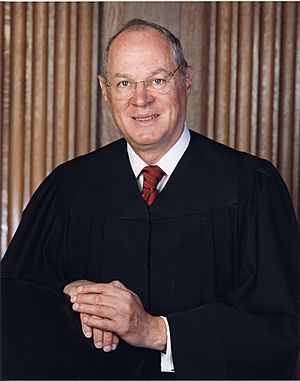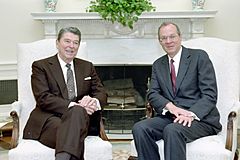Anthony Kennedy facts for kids
Quick facts for kids
Anthony Kennedy
|
|
|---|---|

Official portrait, c. 2005
|
|
| Associate Justice of the Supreme Court of the United States | |
| In office February 18, 1988 – July 31, 2018 |
|
| Nominated by | Ronald Reagan |
| Preceded by | Lewis F. Powell Jr. |
| Succeeded by | Brett Kavanaugh |
| Judge of the United States Court of Appeals for the Ninth Circuit | |
| In office March 24, 1975 – February 18, 1988 |
|
| Nominated by | Gerald Ford |
| Preceded by | Charles Merton Merrill |
| Succeeded by | Pamela Ann Rymer |
| Personal details | |
| Born |
Anthony McLeod Kennedy
July 23, 1936 Sacramento, California, U.S. |
| Spouse |
Mary Davis
(m. 1963) |
| Children | 3 |
| Education | |
| Awards | Henry J. Friendly Medal (2019) |
| Signature | |
| Military service | |
| Allegiance | United States |
| Branch/service | United States Army |
| Years of service | 1961–1962 |
| Rank | Private first class |
| Unit | California Army National Guard |
Anthony McLeod Kennedy (born July 23, 1936) is an American lawyer and judge. He served as an associate justice of the Supreme Court of the United States. He was on the court from 1988 until he retired in 2018. President Ronald Reagan chose him for the job.
The Supreme Court has nine justices. Sometimes, the justices are split 4-4 on a difficult case. The ninth justice's vote decides the outcome. For many years, Justice Kennedy was often this deciding vote, which is known as the swing vote.
Kennedy was born in Sacramento, California. He studied at Stanford University and Harvard Law School. In 1975, President Gerald Ford made him a judge on the United States Court of Appeals for the Ninth Circuit. In 1988, he was confirmed by the United States Senate to join the Supreme Court.
During his time on the court, Kennedy wrote the main opinion for many important cases. These included cases about the rights of prisoners at Guantanamo Bay and four major cases about gay rights. He retired in 2018 and was replaced by Brett Kavanaugh, who had once worked for him as a law clerk.
Contents
Early Life and Schooling
Anthony Kennedy was born in Sacramento, California. His father was a lawyer who was well-known in California politics. His mother was active in the community. Growing up, Kennedy met important politicians like Earl Warren, who was then the governor of California and later became Chief Justice of the Supreme Court.
Kennedy was a top student at C. K. McClatchy High School. He graduated in 1954 and went to Stanford University. There, he became interested in constitutional law, which is the study of the rules that govern the United States. He spent his final year of college at the London School of Economics. He then went to Harvard Law School and graduated in 1961.
Career Before the Supreme Court
After law school, Kennedy worked as a lawyer. When his father died in 1963, he took over his father's law office in Sacramento. From 1965 to 1988, he also taught constitutional law at the McGeorge School of Law.
During this time, he helped California's governor, Ronald Reagan, with a state tax plan. Kennedy also served briefly in the California Army National Guard.
In 1975, President Gerald Ford nominated Kennedy to be a judge on the United States Court of Appeals for the Ninth Circuit. This is one of the highest courts in the country, just below the Supreme Court. The U.S. Senate approved his nomination without any disagreement. He served as a judge on this court for 13 years.
Joining the Supreme Court
How He Was Nominated
In 1987, a spot opened up on the Supreme Court. President Reagan's first choice, Robert Bork, was not approved by the Senate. His second choice withdrew. Reagan then chose Anthony Kennedy.

During his confirmation hearings, senators asked Kennedy many questions. They wanted to understand his views on the law. He talked about the importance of liberty and how the Constitution protects a "zone of liberty" where the government cannot interfere with people's lives.
The Senate investigated his background carefully but found no problems. Both Democrats and Republicans supported him. On February 3, 1988, the Senate voted 97 to 0 to confirm him. He was officially sworn in as a Supreme Court justice on February 18, 1988.
His Role on the Court
Justice Kennedy was known for not belonging to a single group, like "conservative" or "liberal." He looked at each case on its own. For this reason, he was often called the "swing vote." This meant his vote was often the one that decided the case when the other eight justices were evenly split.
On the court led by Chief Justice John Roberts, Kennedy was often the deciding vote in 5–4 decisions. He sided with the conservative justices on many economic issues. However, he often sided with the liberal justices on major social issues.
Kennedy did not like the "swing vote" label. But he was in the majority in over 90% of cases in some years, showing how important his vote was. He retired from the court on July 31, 2018. Two of his former law clerks, Neil Gorsuch and Brett Kavanaugh, later became Supreme Court justices themselves.
Important Legal Decisions
As a justice, Kennedy wrote the court's official opinion in many landmark cases. An opinion explains the legal reasons for the court's decision.
Free Speech
Kennedy was a strong defender of the First Amendment, which protects free speech.
In Citizens United v. FEC (2010), he wrote the majority opinion. This decision stated that the government cannot stop corporations or unions from spending money to support or oppose political candidates. Kennedy argued that this was a form of political speech protected by the First Amendment. This decision led to the creation of "Super PACs," which can raise large amounts of money for political causes.
He also wrote the majority opinion in Packingham v. North Carolina (2017). The court ruled that a state cannot completely ban former criminals from using social media, as it is an important place for free expression.
Gay Rights
Justice Kennedy wrote the opinion for four major cases that expanded the rights of gay and lesbian Americans.
- Romer v. Evans (1996): The Court struck down a Colorado law that would have prevented cities from passing laws to protect gay people from discrimination.
- Lawrence v. Texas (2003): The Court ruled that laws making certain private acts between consenting adults illegal were unconstitutional.
- United States v. Windsor (2013): The Court struck down a federal law that defined marriage as only between a man and a woman. This meant the federal government had to recognize same-sex marriages from states that allowed them.
- Obergefell v. Hodges (2015): In this historic case, Kennedy wrote the opinion that made same-sex marriage legal in all 50 states. He wrote, "No union is more profound than marriage, for it embodies the highest ideals of love, fidelity, devotion, sacrifice and family."
Other Major Cases
- Boumediene v. Bush (2008): Kennedy wrote that prisoners held at the U.S. base in Guantanamo Bay, Cuba, have a constitutional right to challenge their detention in U.S. courts. This is known as the right of habeas corpus.
- Texas v. Johnson (1989): Kennedy joined the majority in a controversial case protecting the right to burn the American flag as a form of political protest. He wrote, "It is poignant but fundamental that the flag protects those who hold it in contempt."
- Bush v. Gore (2000): Kennedy was part of the majority in the 5-4 decision that stopped the recount of votes in Florida during the 2000 presidential election. This decision resulted in George W. Bush becoming president.
Personal Life
Kennedy married Mary Jeanne Davis in 1963. They have three children: Justin, Gregory, and Kristin.
In his free time, Kennedy often taught law classes in Salzburg, Austria, during the summer. He has also spoken publicly about the need to improve conditions in American prisons.
See also
 In Spanish: Anthony Kennedy para niños
In Spanish: Anthony Kennedy para niños
- List of justices of the Supreme Court of the United States
- List of law clerks of the Supreme Court of the United States (Seat 1)
- List of United States Supreme Court justices by time in office
- List of United States federal judges by longevity of service
- United States Supreme Court cases during the Rehnquist Court
- United States Supreme Court cases during the Roberts Court

